
The information stored in the subconscious is not available from consciousness.
Subconscious is that which is part of the subconscious . Subconsciousness, meanwhile, is the state of consciousness in which a person has minimal knowledge of perceptions due to their short duration and intensity.
Below consciousness
The subconscious, therefore, is located below the level of consciousness . This makes it inaccessible or can only be reached with difficulty .
It is important to clarify, however, that the term is no longer frequently used in the field of psychology . The notion is usually used in colloquial language with respect to those mental contents that, because they are repressed , are difficult to access.
What information does it store
Human beings store information in their subconscious although they cannot access it easily. What you do not consciously want to remember, such as a traumatic experience or a repressed desire , can end up lodged in the subconscious.
We must take this into account every time someone, ourselves included, claims not to remember something that they actually experienced or was told, since it has probably lodged in the subconscious. Although so far scientists have not been able to fully understand the limits of the brain, they do know that it stores much more information than we imagine. In its immense capacity are millions of memories, many of which we believe we have lost or not even created .
Let's say that we have at our disposal a large space divided into two parts, to store the data that we collect and process as appropriate: what we want to use, in consciousness, and the rest, in the subconscious. Of course, we can't do this voluntarily, another fascinating feature of our brain that generally acts to protect us and keep us upright.
iceberg analogy
The link between the subconscious and consciousness is often explained through the image of an iceberg . Consciousness is the upper part that emerges above the water; the subconscious, that which exists but cannot be seen with the naked eye because it is below the waterline.
As we mentioned above, in the subconscious the brain stores everything that it does not want to let out, that it hopes we will not find because it could harm us or hinder our performance in society . However, as we will see below, small pieces often break off from the base of this iceberg and reach the surface .
Expressions of the subconscious
According to specialists, the subconscious influences consciousness. That's why the decisions we make consciously may actually be directed by the subconscious (which, in turn, may or may not be in tune with the conscious plane).
The so-called slips of the tongue (involuntary speech errors) and dreams are expressions of the subconscious. Thus, to access the subconscious, free association of ideas and guided dreaming are often used.

Failed actions of the subconscious can put us in trouble.
Regarding slips of the tongue , which are also known as failed acts , the founder of psychoanalysis himself, Sigmund Freud , considered them essential to knowing what his patients were really thinking. In other words, he believed that it was not enough to ask them questions, because their conscious answers were not as deep or sincere as those coming from the subconscious.
In this group of involuntary expressions are repressed desires , which include revealing our true opinions about something or someone and doing those things that society does not consider morally acceptable. Although most people easily detect them in the mouths of their interlocutors, from a scientific point of view it is a phenomenon that is not easy to prove.
